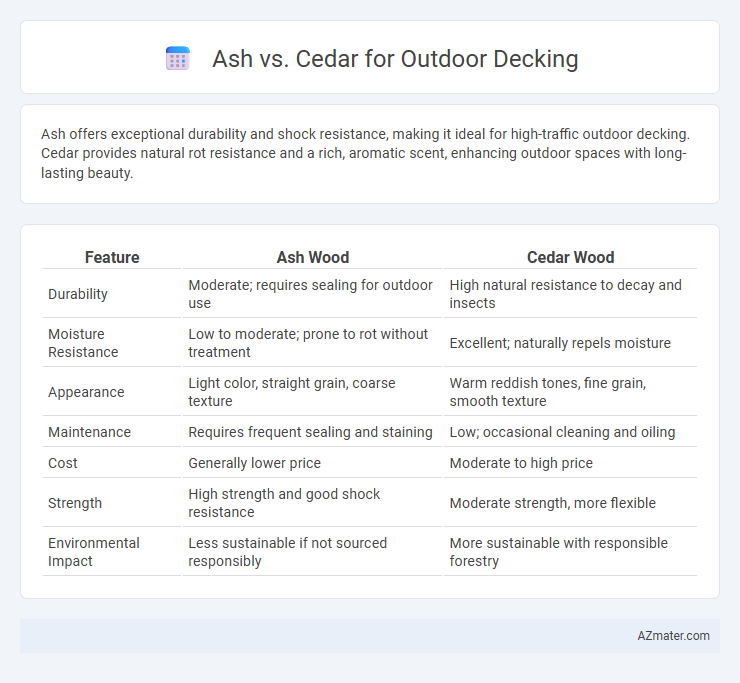Ash offers exceptional durability and shock resistance, making it ideal for high-traffic outdoor decking. Cedar provides natural rot resistance and a rich, aromatic scent, enhancing outdoor spaces with long-lasting beauty.
Table of Comparison
| Feature | Ash Wood | Cedar Wood |
|---|---|---|
| Durability | Moderate; requires sealing for outdoor use | High natural resistance to decay and insects |
| Moisture Resistance | Low to moderate; prone to rot without treatment | Excellent; naturally repels moisture |
| Appearance | Light color, straight grain, coarse texture | Warm reddish tones, fine grain, smooth texture |
| Maintenance | Requires frequent sealing and staining | Low; occasional cleaning and oiling |
| Cost | Generally lower price | Moderate to high price |
| Strength | High strength and good shock resistance | Moderate strength, more flexible |
| Environmental Impact | Less sustainable if not sourced responsibly | More sustainable with responsible forestry |
Introduction: Ash vs Cedar for Outdoor Decking
Ash wood offers exceptional hardness and durability, making it highly resistant to wear and ideal for outdoor decking exposed to heavy foot traffic. Cedar provides natural resistance to moisture, decay, and insect damage, ensuring long-lasting performance in humid or rainy environments. Choosing between ash and cedar depends on balancing the need for strength with natural weather resistance for a durable and attractive outdoor deck.
Wood Characteristics: Ash Compared to Cedar
Ash wood offers exceptional hardness and durability with a Janka hardness rating around 1,320, making it highly resistant to impact and wear for outdoor decking. Its light color with a straight, pronounced grain pattern provides a modern, clean aesthetic, while natural oils in ash offer moderate resistance to moisture and decay compared to cedar. Cedar, with a softer Janka rating of approximately 900, is naturally rich in aromatic compounds that enhance its resistance to insects and rot but requires more frequent maintenance due to its softness and tendency to weather over time.
Durability and Weather Resistance
Ash wood offers moderate durability and good resistance to weather when properly treated, making it suitable for outdoor decking in moderate climates. Cedar naturally resists decay, insects, and moisture due to its natural oils, providing superior weather resistance and longevity without extensive maintenance. For outdoor decking, cedar generally outperforms ash in terms of durability and resilience to harsh weather conditions.
Maintenance Requirements
Ash outdoor decking demands regular sealing or staining to maintain its durability and prevent moisture damage, as it is moderately porous and susceptible to weathering. Cedar, known for its natural oils and resistance to rot and insects, requires less frequent maintenance but benefits from periodic cleaning and occasional reapplication of protective finishes to preserve its color and structural integrity. Both woods thrive with routine care, but cedar offers a lower-maintenance advantage due to its inherent weather-resistant properties.
Appearance and Aesthetic Appeal
Ash wood offers a light, creamy color with a straight, uniform grain pattern that lends a modern, clean look to outdoor decking, enhancing brightness in shaded areas. Cedar features a rich reddish-brown hue with prominent knots and a natural rustic charm, providing warm, inviting aesthetics that age gracefully with a silver patina over time. Both woods complement diverse architectural styles, with ash ideal for sleek, contemporary designs and cedar suited for traditional or cabin-inspired outdoor spaces.
Sustainability and Environmental Impact
Ash wood offers strong durability and natural resistance for outdoor decking while being sourced from fast-growing, sustainably managed forests, making it an eco-friendly choice. Cedar, known for its natural insect-repellent properties and rot resistance, comes from slower-growing trees but is often harvested from certified sustainable plantations, reducing environmental impact. Both materials provide biodegradable decking options with lower carbon footprints compared to synthetic alternatives, supporting environmentally conscious outdoor projects.
Cost Comparison: Ash vs Cedar Decking
Ash decking typically costs between $5 and $10 per square foot, offering a durable and affordable option for outdoor decks. Cedar decking ranges from $6 to $12 per square foot but provides natural resistance to decay and insects, often reducing long-term maintenance expenses. Choosing between Ash and Cedar hinges on balancing initial material costs with durability and upkeep priorities.
Installation Process and Workability
Ash wood offers a smoother installation process for outdoor decking due to its consistent grain and moderate hardness, enabling easy cutting and fastening with common tools. Cedar's natural oils provide resistance to decay and insects, but its softer texture can lead to more careful handling to avoid dents or splintering during installation. Both woods maintain excellent workability, though ash requires less maintenance post-installation, making it a practical choice for durable, easy-to-build outdoor decks.
Lifespan and Long-Term Performance
Ash wood, known for its natural strength and density, typically offers a lifespan of 15 to 20 years in outdoor decking applications, resisting moderate wear and weathering. Cedar, prized for its inherent rot resistance and natural oils, can last 20 to 30 years when properly maintained, offering superior durability against moisture and insect damage. While Ash provides excellent impact resistance, Cedar's long-term performance excels due to its better stability and resistance to decay in outdoor environments.
Conclusion: Choosing Between Ash and Cedar for Decking
Ash offers exceptional hardness and durability, making it ideal for high-traffic outdoor decking that requires resistance to wear and impact. Cedar provides natural resistance to decay and insect damage, along with a distinctive aroma and warm color that enhance aesthetic appeal. Selecting between ash and cedar depends on prioritizing either structural strength and longevity or natural weather resistance and visual charm for your decking needs.

Infographic: Ash vs Cedar for Outdoor Decking
 azmater.com
azmater.com